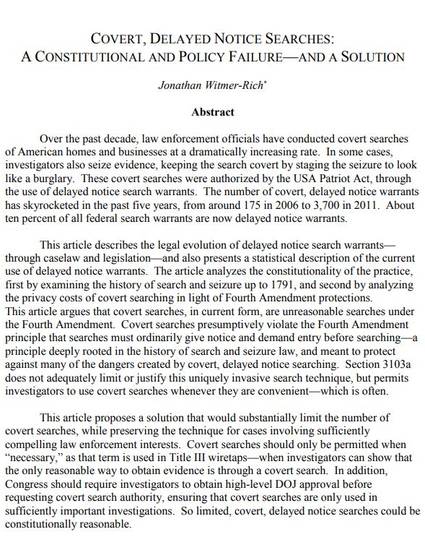
Unpublished Paper
Covert, Delayed Notice Searches: A Constitutional and Policy Failure—And a Solution
ExpressO
(2012)
Abstract
Over the past decade, law enforcement officials have conducted covert searches of American homes and businesses at a dramatically increasing rate. In some cases, investigators also seize evidence, keeping the search covert by staging the seizure to look like a burglary. These covert searches were authorized by the USA Patriot Act, through the use of delayed notice search warrants. The number of covert, delayed notice warrants has skyrocketed in the past five years, from around 175 in 2006 to 3,700 in 2011. About ten percent of all federal search warrants are now delayed notice warrants.
This article describes the legal evolution of delayed notice search warrants—through caselaw and legislation—and also presents a statistical description of the current use of delayed notice warrants. The article analyzes the constitutionality of the practice, first by examining the history of search and seizure up to 1791, and second by analyzing the privacy costs of covert searching in light of Fourth Amendment protections.
This article argues that covert searches, in current form, are unreasonable searches under the Fourth Amendment. Covert searches presumptively violate the Fourth Amendment principle that searches must ordinarily give notice and demand entry before searching—a principle deeply rooted in the history of search and seizure law, and meant to protect against many of the dangers created by covert, delayed notice searching. Section 3103a does not adequately limit or justify this uniquely invasive search technique, but permits investigators to use covert searches whenever they are convenient—which is often.
This article proposes a solution that would substantially limit the number of covert searches, while preserving the technique for cases involving sufficiently compelling law enforcement interests. Covert searches should only be permitted when “necessary,” as that term is used in Title III wiretaps—when investigators can show that the only reasonable way to obtain evidence is through a covert search. In addition, Congress should require investigators to obtain high-level DOJ approval before requesting covert search authority, ensuring that covert searches are only used in sufficiently important investigations. So limited, covert, delayed notice searches could be constitutionally reasonable.
Keywords
- delayed notice search warrants,
- covert searches,
- fourth amendment
Disciplines
Publication Date
August 23, 2012
Citation Information
Jonathan Witmer-Rich. "Covert, Delayed Notice Searches: A Constitutional and Policy Failure—And a Solution" ExpressO (2012) Available at: http://works.bepress.com/jonathan_witmer_rich/3/
